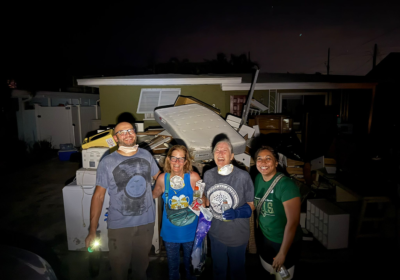Adjunct Q&A elicits more questions than answers

USF hosts informational session featuring a potentially bias speaker. ORACLE PHOTO/ CHAVELI GUZMAN
In an attempt to answer questions about unionization from concerned adjunct professors, USF announced they will have voluntary informational sessions. However, many of these adjuncts are concerned with the impartiality of the hired speaker.
In a letter to adjunct professors, Dwayne Smith, senior vice provost and dean of the Office of Graduate Studies, said USF will provide a resource to them.
“The university’s highest priority is that there is no interference with your right to decide whether or not you wish to vote in a union and that you have access to the information you need to make an informed decision,” Smith said. “We have already received many questions from adjuncts, and we want to be sure that we respond to those questions in a consistent and timely manner.
“To that end, we have partnered with a labor attorney, Katie Lev, who works as an adjunct professor at Boston College, to answer questions and provide information about labor law and unionization in general.”
In response to this, the Service Employees International Union (SEIU) and other concerned parties sent a letter to USF questioning Lev’s impartiality in the matter.
“As a Commonwealth Employment Relations Board (CERB) member, you are tasked with serving citizens of the state of Massachusetts in neutrally overseeing and ruling on public sector labor disputes,” the letter said. “The public and Governor have entrusted you with the power to fairly enforce labor laws. We believe that by acting as a consultant to aid institutions seeking to block and discourage worker organizing, your ability to adjudicate impartially is called into question.”
SEIU — the organization USF adjuncts are voting on whether or not to unionize with — leadership signed the letter along with Barbara Madeloni, President of the Massachusetts Teachers Association, and Alphonso Mayfield, President of the Florida Public Services Union.
Another issue that brought about these concerns was an article written by The Huffington Post. The article outlines Lev’s involvement in a news site, Law360, attempting to unionize. Lev gave a similar talk to these employees in which she appeared to be bias.
“As is standard, Lev does not tell employees how to vote, but she does manage to paint a scary portrait of unionizing,” the article said. “She warns that things may not improve despite paying union dues, that employees may not like what’s in the contract (”you better hope that everybody else wants the same things you want”) and that a union is difficult to get rid of once it’s there.”
Prior to the informational session on Tuesday, Lev attempted to clear this up.
“I’ll be completely honest with you, I was hired by USF, so I just don’t want to give the impression that I’m something that I’m not just because I am providing you with factual information,” Lev said. “I’m not a neutral third party in this particular matter. The union is not going to be neutral. They are bias when they present you information. Frankly, I don’t have an opinion as to how I want you to vote”
Dana Corrigan, an animation adjunct professor, said these sessions are misleading to adjuncts who may not know any better.
“The university has a very particular standpoint that is not neutral,” Corrigan said. “These are being advertised as informational sessions that are meant to give information to people who may not know about unions. They’re going into these events not knowing they’re getting a biased directive to potentially intimidate them.”
Lev presented adjuncts with basic information on how the unionization process works as well as the actual voting process that will start this week. However, in some instances, Lev inserted her opinion on unions.
“Imagine the worst employer you could ever think of,” Lev said. “Imagine your least favorite job ever. Imagine a really terrible employer. If they’re so bad and they don’t care about their employees and they don’t want to help their employees, it’s a leap, and this is in my opinion, to think that they’re necessarily going to do what you want them to do just because the union asks.”
In between her factual presentation points, Lev said she herself would not be in favor of unionization.
“I would prefer to speak for myself because I would be concerned that what I want for my working conditions might not be appropriately represented by the majority,” Lev said. “I’d rather speak for myself.”
Many of the adjuncts that are in favor of unionization and attended this session picked up on this and began to question her.
“The way you’re subtly framing this argument is misleading,” Tara Blackwell, an adjunct biology professor, said. “There’s a subtle undercurrent of, ‘Well, these are the facts, but you really don’t want to vote for this, because you’ll get screwed.’”
Jarad Fennell, an English literature adjunct professor, said Lev adjusted her comments when this questioning began.
“Some of the information she put up there seemed slightly biased, but I think when we started aggressively questioning her, she tried to be much more neutral,” Fennell said.
After the session, Blackwell said she doesn’t trust Lev or USF’s motivations for this at all.
“A lawyer’s job, by definition, is to spin the evidence to make it look favorable to their client,” Blackwell said. “She’s being paid by USF administration, who has done nothing but obstruct, delay, deny and insult us. I don’t buy this ‘Oh, I’m just presenting the facts business for a minute.’”
Fennell said this choice of resource provided by USF makes him question the intentions of the university.
“I wonder about their (USF) motivations a little bit,” Fennell said. “I read up on her beforehand and I was surprised that she had that kind of background. It seemed like she was being hired to sort of union-bust and discourage us for voting for the union.”
According to Corrigan, one positive that came out of the session was a feeling of unity.
“One thing I definitely noticed was the frustrations of the other adjuncts,” Corrigan said. “It kind of brings a feeling of camaraderie because we don’t get to see each other that much. You could feel their frustrations, and it makes my own feel more justified.”






